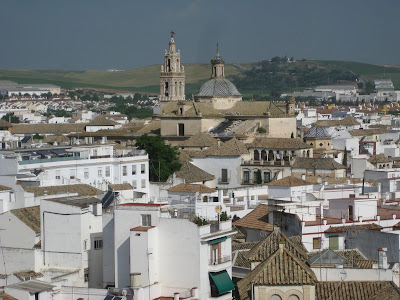The
courtyard is bathed in brilliant sunshine and the brown and white bell tower looms
above me. There’s a man sweeping the floor and I tell him I want to climb to
the top. He leads me into the chapel, where the light is muted, and I catch a
glimpse of a huge and splendid gold altar. The caretaker takes me to a glass
table where images of Christ can be purchased. I just give him a 2 euro ‘donation’
for the privilege of ascending the 115 steps.
I quickly reach the
level of the bells, which are discoloured from the passage of hundreds
of years. It occurs to me that a deafening din might break out at
any moment, so I check my watch: it’s 10.15. I figure I have another fifteen
minutes before I need to worry about my eardrums being blasted out. Through the
arches I see low hills in three directions and a vast open plain to the north.
We came to Ecija from the west, from Seville, over a
flat and dry landscape where little grows, except the hardy olive tree. The
only notable settlement between the two is the striking hilltop town of
Carmona. After an hour or so Ecija came into view, its famous towers standing
out above the whitewashed buildings.
They call Ecija the sartenilla (frying pan) of Andalusia.
The English writer Laurie Lee described it as ‘a lake of sun, a reservoir of
heat’. On the early May afternoon that we arrived the temperature was in the
high twenties, and it was startlingly bright.
There is a soporific character to the
place. We arrived during the siesta and felt exhausted enough to have a lie
down ourselves. Then we ventured into the main square, the Plaza de España, and didn’t even make it all the way
across before stopping in a café. We stayed for an hour and a half, drinking
coke and beer and watching children run around while their mothers sat in the
shade and gossiped.
The next morning, in the tower, it is
cool, for a light breeze blows through the gaps, and the landing is in the
shade. The main sound is the chirruping of birds calling to one another,
although I hear the occasional human voice from the narrow streets. From far
away, the faint hum of traffic is audible, but is mostly drowned out by the
lyrical songs of the birds.
From my vantage point above the
church of San Juan Bautista I see brown and orange
towers all around. I had heard these edifices were decaying,
but they look spruce and magnificent. Best of all is the tower above
Santa Maria church, a majestic and ornate spire that recalls the Giralda in Seville.
A single bell
tolls from some unseen church, marking the half hour, followed a few seconds
later by another single chime. Then the nearby narrow tower above the church of
San Gil erupts in noise, the sound wonderfully resonant at this height. I stay
another fifteen minutes, my solitude uninterrupted by another soul.
As I leave the
courtyard I notice the caretaker staring at me and it occurs to me that perhaps Ecija
receives few tourists. Maybe the energy-sapping heat puts them off. It's worth it, though, just for that view from the tower.



